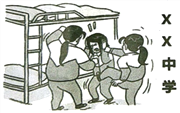
科目: 来源: 题型:
【题目】 Nobody except Lily and Lucy___New York for a month last year. Only they can be our guides.
A. have been in B. has been in
C. was in D. has been to
查看答案和解析>>
科目: 来源: 题型:
【题目】__________ his bike that was bought made his parents very angry.
A. Lost B. The loss
C. His loss D. Losing
查看答案和解析>>
科目: 来源: 题型:
【题目】----What’s in your ________ hand? ------Nothing but a coin.
A. other B. the other
C. another D. others
查看答案和解析>>
科目: 来源: 题型:
【题目】—What do you usually do at the weekend?
—I the TV program “Who’s Still Standing? (一站到底)” with my family.
A. used to watch
B. am used to watch
C. was used to watching
D. get used to watching
查看答案和解析>>
科目: 来源: 题型:
【题目】 --What do you often do after class?
-- I often play basketball ___________ my friends.
A. with B. for C. from D. to
查看答案和解析>>
科目: 来源: 题型:
【题目】86,请结合下面两幅图片所示内容, 以“How to behave(表现)at school?”为题写ー篇短文。
要求:
1.简要描述两幅图片, 并针对这些校园欺凌现象谈谈自己在学校应该如何做(至少2点);
2.文中不得出现考生真实的姓名和学校名称;
3.80个词左右, 已给出的部分不计人总词数。


参考词汇:beat, kick, laugh at, respect(尊重), harmonious(和谐的)
How to Behave at School?
There is something unpleasant happening at school. In Picture One, _________________________________________________________________________________________________________________
查看答案和解析>>
科目: 来源: 题型:
【题目】If I were to ask you to close your eyes and I gave you a piece of apple to eat, would you be able to tell me what it is just by tasting it? Of course, you could. Your tongue (舌头) helps you know what different foods taste like. Do you know that foods would taste different if you did not have a nose?
What You Need
☆ a friend to help
☆ small pieces of any food like carrot, orange, banana—whatever you have
☆ small pieces of apples, raw (uncooked) potato and (if you are brave) onion (洋葱)
What You Do
There are actually three different experiments. You and your friend should take turns trying them on each other.

Experiment 1:
Have your friend close her eyes and open her mouth. Give her a piece of the food and ask her to taste it. Then, ask her what she thinks it is. She will probably guess correctly.
Experiment 2:

While your friend has her eyes closed, give her a piece of raw potato. At the same time, hold a piece of apple right under her nose. Ask her to eat the potato and tell you what she thinks it is. She will say it is a piece of apple! You can even do it the other way around, and she will think she is eating a potato, or, perhaps, she won’t be able to name what she is eating.

Experiment 3: (for the brave)
Take a piece of raw onion. You don’t have to close your eyes this time. Press your nose closed with your other hand so that no smells can get into your nose. Now eat a small piece of the onion. Surprise! As long as you hold your nose, you will not be able to taste the onion.
The Science Secret
You already know the science secret. Your nose and your tongue work together to make food taste the way it does. Your tongue, however, can taste only certain flavors like salty, bitter, sour, and sweet. All of the other “tastes” are actually “smells”, and you need your nose to taste them.
Oh, you might use this science secret the next time you are forced to eat something you don’t like the taste of. If you hold your nose while you eat it, you won’t “taste” it at all.
【1】According to this article, what could a person know about food?
A. People hold their noses to eat onions.
B. If you close your eyes, food will taste better.
C. People need a sense of smell to taste some food.
D. If you can smell potatoes, you will taste apples.
【2】What is the most probable reason Experiment 3 is called “for the brave”?
A. You have to eat a raw onion. B. You keep your eyes open.
C. You have to hold your nose. D. You do the experiment alone.
【3】What can we learn from the passage?
A. Knowledge comes from personal experience.
B. Team work helps us to find out science secrets.
C. We should have courage while doing experiments.
D. We can’t draw a conclusion simply from the feeling.
【4】What’s the passage mainly about?
A. Why different foods can smell the same.
B. How smell influences the way food tastes.
C. Why some things smell better than others.
D. How smell changes the way we see things.
查看答案和解析>>
科目: 来源: 题型:
【题目】They are talking about _______.
A. if our teacher doesn’t come, if we can go.
B. where we will go to Beijing this Sunday.
C. how to get.
D. whether that is something wrong with it.
查看答案和解析>>
科目: 来源: 题型:
【题目】A) 连词成句(共5小题,每小题1分,计5分)
![]()
![]() 将所给单词连成句子。要求符合语法,语句通顺,大小写正确,单词不得重复使用,标点已给出。
将所给单词连成句子。要求符合语法,语句通顺,大小写正确,单词不得重复使用,标点已给出。
【1】Linda, my, name, friend ‘s, is
______________________________________________________________________.
【2】learning English, she, good at, is
______________________________________________________________________.
【3】at all, she, like, doesn’t, physics
______________________________________________________________________.
【4】it, she, too difficult, is, says
______________________________________________________________________.
【5】learn physics, it, is, to, difficult
______________________________________________________________________?
查看答案和解析>>
科目: 来源: 题型:
【题目】─It’s said that sandstorms seldom hit that area, they?
─_______,but things are different now.
A.do,Yes B.didn’t ,No
C.did , No D.did, Yes
查看答案和解析>>
湖北省互联网违法和不良信息举报平台 | 网上有害信息举报专区 | 电信诈骗举报专区 | 涉历史虚无主义有害信息举报专区 | 涉企侵权举报专区
违法和不良信息举报电话:027-86699610 举报邮箱:58377363@163.com